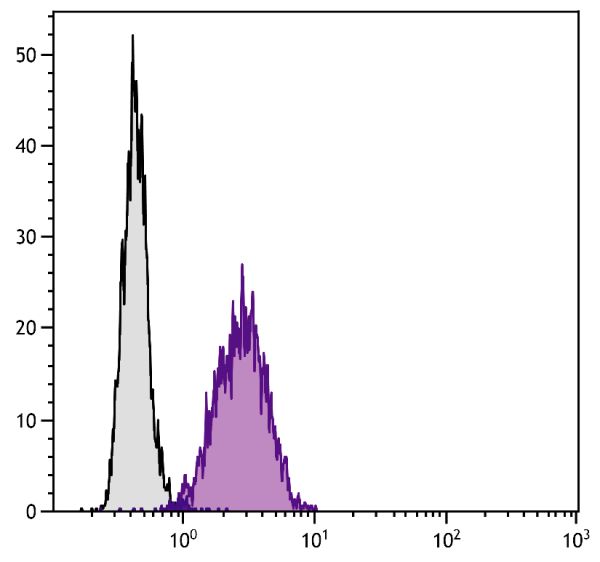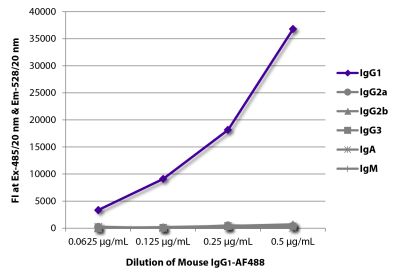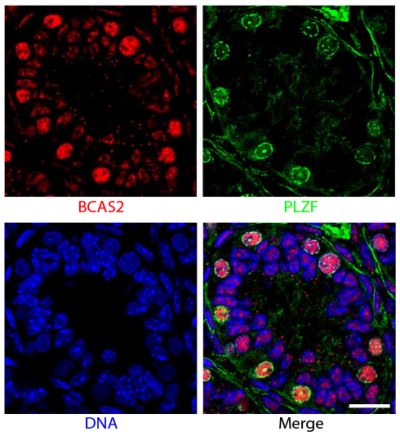Mouse Anti-Human CD105-AF488 (SN6)
Cat. No.:
9811-30
Alexa Fluor® 488 Anti-Human CD105 antibody for use in flow cytometry, immunohistochemistry / immunocytochemistry, and western blot assays.
$266.00


| Clone | SN6 |
|---|---|
| Isotype | Mouse (BALB/c) IgG1κ |
| Isotype Control | Mouse IgG1-AF488 (15H6) |
| Specificity | Human/Horse CD105 |
| Alternative Names | Endoglin |
| Description | CD105, also known as endoglin, is a 90 kDa type II transmembrane glycoprotein that is expressed on the cell surface as a disulfide-linked homodimer and is found on endothelial cells. CD105 is one of several receptors for the various isoforms of TGF which in turn is one of a family of proteins involved in regulation of cell differentiation, migration of cells, and control on the immune response. |
| Immunogen | Antigen preparation isolated from cell membranes of leukemia cells derived from a patient with non-T/non-B-cell acute lymphoblastic leukemia (ALL) |
| Conjugate | AF488 (Alexa Fluor® 488) |
| Buffer Formulation | Phosphate buffered saline containing < 0.1% sodium azide |
| Clonality | Monoclonal |
| Concentration | Lot specific |
| Volume | 1.0 mL |
| Recommended Storage | 2-8°C; Avoid exposure to light |
| Trademark Information | Alexa Fluor® is a registered trademark of Thermo Fisher Scientific, Inc. or its subsidiaries |
| Applications |
Flow Cytometry – Quality tested 8-11 Immunohistochemistry-Frozen Sections – Reported in literature 2 Immunohistochemistry-Paraffin Sections – Reported in literature 3 Immunocytochemistry – Reported in literature 4,11 Immunoprecipitation – Reported in literature 1,5,7 Western Blot-Non-Reducing – Reported in literature 6 Purification – Reported in literature 7 |
| RRID Number | AB_2797100 |
| Gene ID |
2022 (Human) 100070421 (Horse) |
| Gene ID Symbol |
ENG (Human) ENG (Horse) |
| Gene ID Aliases | END; HHT1; ORW1; CD105 |
| UniProt ID |
P17813 (Human |
| UniProt Name |
EGLN_HUMAN (Human) |
Documentation
Certificate of Analysis Lookup
Enter the Catalog Number and Lot Number for the Certificate of Analysis you wish to view
- 1. Haruta Y, Seon BK. Distinct human leukemia-associated cell surface glycoprotein GP160 defined by monoclonal antibody SN6. Proc Natl Acad Sci USA. 1986;83:7898-902. (Immunogen, IP)
- 2. Toi H, Tsujie M, Haruta Y, Fujita K, Duzen J, Seon BK. Facilitation of endoglin-targeting cancer therapy by development/utilization of a novel genetically engineered mouse model expressing humanized endoglin (CD105). Int J Cancer. 2014 May 28. doi: 10.1002/ijc.28994. [Epub ahead of print] (IHC-FS)
- 3. Chung Y, Hou Y, Pan AC. Endoglin (CD105) expression in the development of haemorrhoids. Eur J Clin Invest. 2004;34:107-112. (IHC-PS)
- 4. Meng Q, Lux A, Holloschi A, Li J, Hughes JM, Foerg T, et al. Identification of Tctex2β, a novel dynein light chain family member that interacts with different transforming growth factor-β receptors. J Biol Chem. 2006;281:37069-80. (ICC)
- 5. Takahashi N, Kawanishi-Tabata R, Haba A, Tabata M, Haruta Y, Tsai H, et al. Association of serum endoglin with metastasis in patients with colorectal, breast, and other solid tumors, and suppressive effect of chemotherapy on the serum endoglin. Clin Cancer Res. 2001;7:524-32. (IP)
- 6. Shinojima N, Hossain A, Takezaki T, Fueyo J, Gumin J, Gao F, et al. TGF-β mediates homing of bone marrow-derived human mesenchymal stem cells to glioma stem cells. Cancer Res. 2012;73:2333-44. (WB)
- 7. Seon BK, Matsuno F, Haruta Y, Kondo M, Barcos M. Long-lasting complete inhibition of human solid tumors in SCID mice by targeting endothelial cells of tumor vasculature with antihuman endoglin immunotoxin. Clin Cancer Res. 1997;3:1031-44. (IP, Purification)
- 8. Røsland GV, Svendsen A, Torsvik A, Sobala E, McCormack E, Immervoll H, et al. Long-term cultures of bone marrow-derived human mesenchymal stem cells frequently undergo spontaneous malignant transformation. Cancer Res. 2009;69:5331-9. (FC)
- 9. Guasti L, Prasongchean W, Kleftouris G, Mukherjee S, Thrasher AJ, Bulstrode NW, et al. High plasticity of pediatric adipose tissue-derived stem cells: too much for selective skeletogenic differentiation?. Stem Cells Transl Med. 2012;1:384-95. (FC)
- 10. Schmitt A, Ehnert S, Schyschka L, Buschner P, Kühnl A, Döbele S, et al. Monocytes do not transdifferentiate into proper osteoblasts. ScientificWorldJournal. 2012;2012:384936. (FC)
- 11. De Schauwer C, Piepers S, Van de Walle GR, Demeyere K, Hoogewijs MK, Govaere JL, et al. In search for cross-reactivity to immunophenotype equine mesenchymal stromal cells by multicolor flow cytometry. Cytometry A. 2012;81:312-23. (FC, ICC, Horse Reactivity)
See All References





